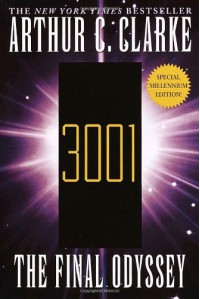3001 The Final Odyssey
 This book reads more like a travelogue of the 3000s than a novel. The central narrative of the series is just barely there in the background and whatever closure you're expecting from the series fails to materialize altogether. The milemarkers that do exist in the story seem to serve the overriding purpose of providing a context for lengthy infodumps - which in the previous books in the series I lauded for their accuracy and inspiration. This time around the science becomes a little iffy, at least in the biology department.
This book reads more like a travelogue of the 3000s than a novel. The central narrative of the series is just barely there in the background and whatever closure you're expecting from the series fails to materialize altogether. The milemarkers that do exist in the story seem to serve the overriding purpose of providing a context for lengthy infodumps - which in the previous books in the series I lauded for their accuracy and inspiration. This time around the science becomes a little iffy, at least in the biology department. 3001 is the story of Frank Poole - that's right, that Frank Poole. Poole was "killed" by Hal a millenium before and has been adrift in space ever since. He is discovered by comet miner Dimitri Chandler out in the Kuiper belt on a mission to bring frozen water to the inner solar system as part of a terraforming program. Poole's frozen body is revived - miraculously avoiding brain damage due to oxygen deprivation or cell wall rupture due to the freezing of the water in his system. Anywho, the rest of the "novel" consists of episodic interludes of Frank's attempts to adjust to life in the 4th millenium accompanying scientific speculation - projection into the future based on scientific and engineering discoveries that were novel at the time of writing. Three-quarters of the way through, the monolith arc comes to an abrupt and disappointing close. No new information is added about the monolith's creators above and beyond what Clarke has already speculated in previous books. The fate of Heywood Floyd, so mysteriously left at the end of 2061 is never mentioned at all. Gone is all the suspense and slow ominousness of 2001. What remains is something akin to Michio Kaku's [b:Visions: How Science Will Revolutionize the 21st Century|785432|Visions How Science Will Revolutionize the 21st Century|Michio Kaku|http://d.gr-assets.com/books/1320458198s/785432.jpg|1156061] and other speculative science.
This novel also heavily self-plagiarizes - a fact that Clarke gleefully admits to in the introduction. What was once a slight annoyance in the first sequel, steadily grows until almost anything of literary merit in this volume comes from a previous book in the series. Not just odd passages, but whole chapters are lifted verbatim from 2001, 2010 and 2061 as Clarke needlessly recaps prominent events in the series. Perhaps this wouldn't have been so annoying if I had spaced them out and not read the whole quadrology back-to-back. Still, the brevity of this work almost demands more original content and the volume of copied work would have pissed me off if I'd bought this hot off the presses in the late 90s.
Just about the only good thing from this whole mess is Clarke's usual crediting of scientific ideas in the afterword. For those who are scientifically-inclined and want to see where Clarke took his inspiration from, it's worth checking out. This scientific "grounding" adds to the believability of the universe he imagines and, in spite of the narrative failure of 3001 earns him brownie points in my book.
Stick to [b:2001: A Space Odyssey|70535|2001 A Space Odyssey (Space Odyssey, #1)|Arthur C. Clarke|http://d.gr-assets.com/books/1348775483s/70535.jpg|208362] and maybe [b:2010: Odyssey Two|70539|2010 Odyssey Two (Space Odyssey, #2)|Arthur C. Clarke|http://d.gr-assets.com/books/1348084271s/70539.jpg|615175], then abandon ship.



